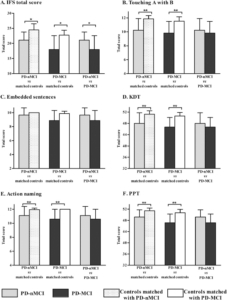Syntax, action verbs, action semantics, and object semantics in Parkinson’s disease: Dissociability, progression, and executive influences
Cortex
Bocanegra, Y., García, A. M., Pineda, D., Buriticá, O., Villegas, A., Lopera, F., Gómez, D., Arias, C., Cardona, J. F., Trujillo, N. & Ibáñez, A. (2015). Syntax, action verbs, action semantics, and object semantics in Parkinson’s disease: Dissociability, progression, and executive influences. Cortex 69, 237-254. Online: http://bit.ly/1La7EQq.
Varios estudios han demostrado recientemente que el deterioro de los ganglios basales (BG) provoca deficiencias distintivas en los dominios de la sintaxis, los verbos de acción y la semántica de acción. En particular, se han observado repetidamente esas alteraciones en pacientes con enfermedad de Parkinson (EP). Sin embargo, sigue sin estar claro si estos déficits son específicos del lenguaje y si son igualmente disociables de otros trastornos notificados -a saber, el procesamiento de la semántica de los objetos. Para abordar estas cuestiones, administramos tareas lingüísticas, semánticas y de función ejecutiva (EF) a dos grupos de pacientes de EP no dementes, con y sin deterioro cognitivo leve (PD-MCI y PD-nMCI, respectivamente). Comparamos estos dos grupos entre sí y con muestras coincidentes de controles sanos. Nuestros resultados mostraron que los pacientes de EP mostraron déficits lingüísticos y semánticos incluso en ausencia de DCL. Sin embargo, no todos los dominios estaban relacionados por igual con los FE y el DCL en todas las muestras. Mientras que los FE predijeron perturbaciones de sintaxis y semántica de objetos tanto en PD-nMCI como en PD-MCI, no tuvieron impacto en las deficiencias de acción-verbo y acción-semántica en ninguno de los dos grupos. De manera crítica, los pacientes mostraron alteraciones de la producción de acción-verbo y de la semántica de acción en ausencia de DCL y sin ninguna influencia ejecutiva, lo que sugiere un déficit sui generis presente desde las primeras etapas de la enfermedad. Estos hallazgos indican que los diversos dominios del lenguaje se relacionan de manera diferencial con la BG, contradiciendo los enfoques populares de la neurolingüística.
Para acceder al artículo hacé click AQUÍ
Syntax, action verbs, action semantics, and object semantics in Parkinson’s disease: Dissociability, progression, and executive influences
Cortex
Bocanegra, Y., García, A. M., Pineda, D., Buriticá, O., Villegas, A., Lopera, F., Gómez, D., Arias, C., Cardona, J. F., Trujillo, N. & Ibáñez, A. (2015). Syntax, action verbs, action semantics, and object semantics in Parkinson’s disease: Dissociability, progression, and executive influences. Cortex 69, 237-254. Online: http://bit.ly/1La7EQq.
Several studies have recently shown that basal ganglia (BG) deterioration leads to distinctive impairments in the domains of syntax, action verbs, and action semantics. In particular, such disruptions have been repeatedly observed in Parkinson’s disease (PD) patients. However, it remains unclear whether these deficits are language-specific and whether they are equally dissociable from other reported disturbances –viz., processing of object semantics. To address these issues, we administered linguistic, semantic, and executive function (EFs) tasks to two groups of non-demented PD patients, with and without mild cognitive impairment (PD-MCI and PD-nMCI, respectively). We compared these two groups with each other and with matched samples of healthy controls. Our results showed that PD patients exhibited linguistic and semantic deficits even in the absence of MCI. However, not all domains were equally related to EFs and MCI across samples. Whereas EFs predicted disturbances of syntax and object semantics in both PD-nMCI and PD-MCI, they had no impact on action-verb and action-semantic impairments in either group. Critically, patients showed disruptions of action-verb production and action semantics in the absence of MCI and without any executive influence, suggesting a sui generis deficit present since early stages of the disease. These findings indicate that varied language domains are differentially related to the BG, contradicting popular approaches to neurolinguistics.
To access the full paper please click here



